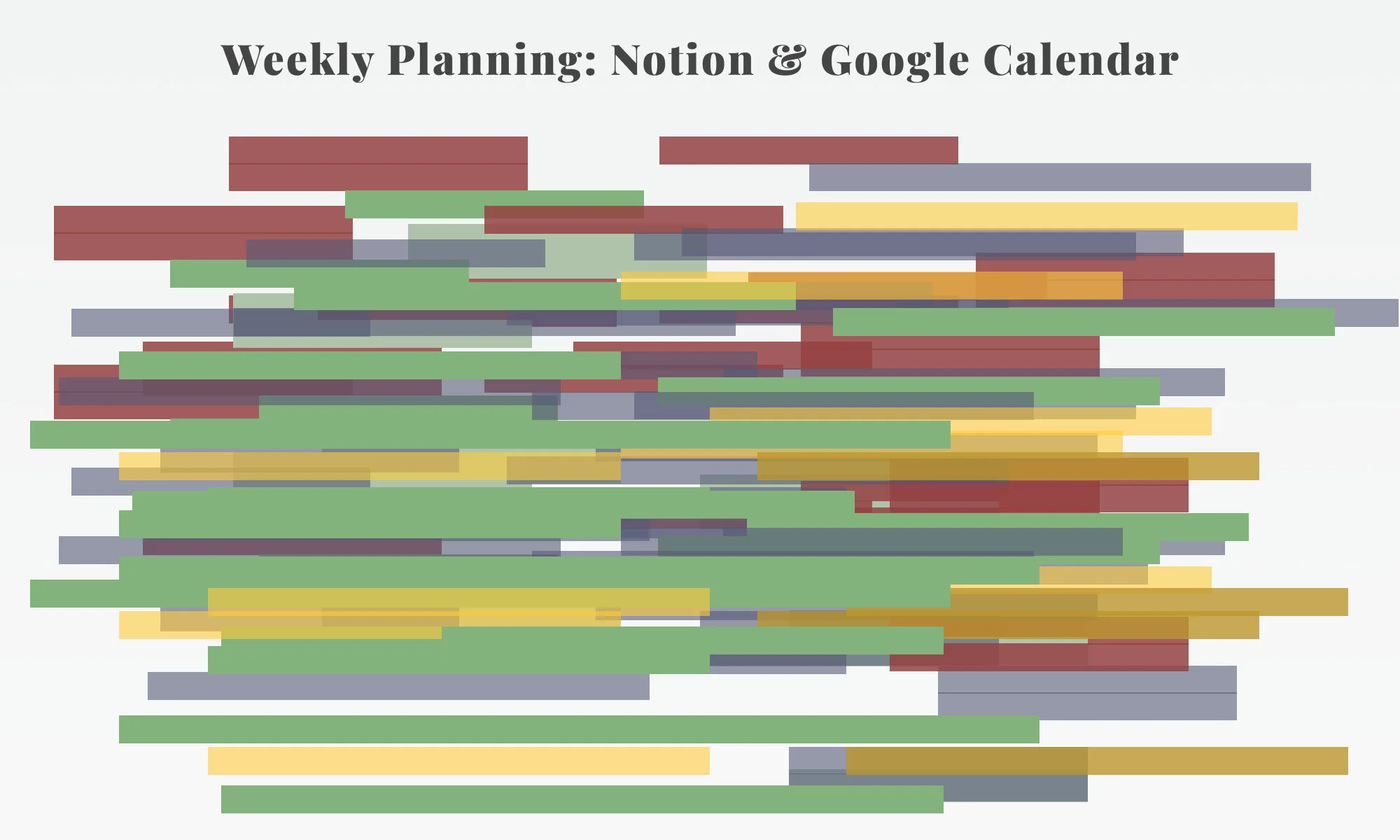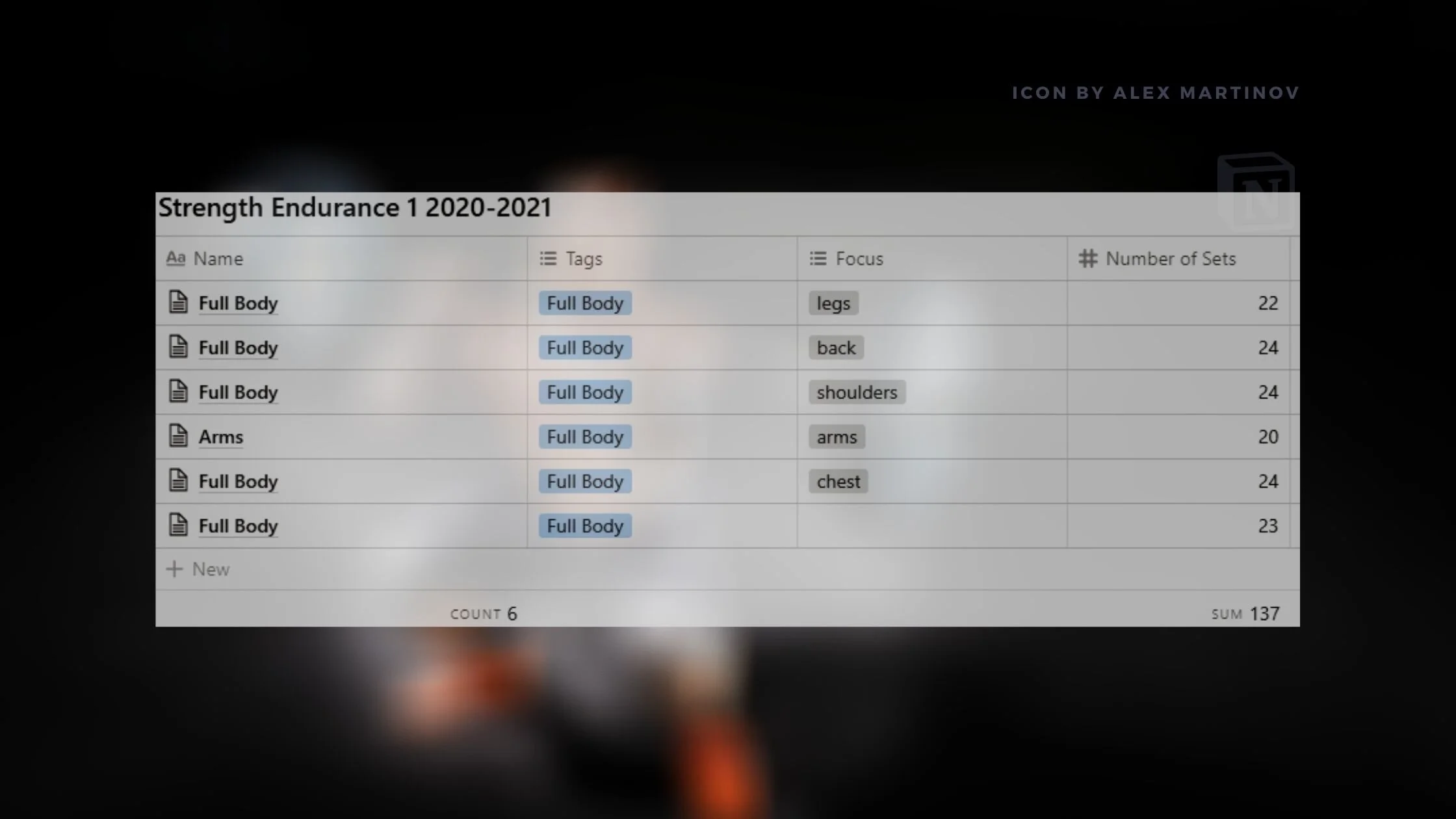Effective Time Management and Weekly Planning in Notion
To go directly to the system I currently use to plan for the week (and skip the introduction), click here.
How do you balance planning and living in the present moment? Do you need to balance them in the first place? This video might be a good place to begin reflecting on this question, considering the seemingly important role that both planning and staying present have in our lives.
Our minds wander constantly, submersed by thoughts arising at lightning speed. We worry about the future, ruminate on past experiences, compare ourselves to people around us. But, one could argue, planning for the future does not correspond to worrying about the future and what awaits us in some months, or years. Anxious and negative thoughts about the future are not very relevant per se if they only serve as fear-inducing and inaction-provoking mechanisms. The main purpose of anxiety and thinking about the future might lie in the utility they have for the present moment: as a matter of fact, some level of anxiety can be a key catalyst for taking action in the present moment, to make sure that the future reserves the best outcomes as we positively envision them. This implies that some level of anxiety for the future is often necessary in order to fuel our internal machine guided by thoughts toward action. Neuroscientist Sam Harris explains the role of anxiety in our lives in this conversation, among the other enlightening ideas he shares.
In the more practical, productivity-centered world, planning for the future is all about making sure that what is controllable is under control, as the Stoics would say. Planning for the future has the practical benefit of providing us with a roadmap on what it is we are headed towards, and how we would plan to achieve that destination. Or, planning for the future can serve to add stability and a sense of meaning to our life, because meaning can be sourced from a clear vision and direction for our life. It would be much more complicated to find purpose in completely unstructured territory, although this certainly varies based on our personality traits and aspects, as well as individual attitudinal characteristics, with people high in openness to experience more likely to find meaning in free creativity and the flow of life. Having a direction in life is a non-trivial topic, as far as I can tell, and it's one of the main mechanisms induced by Cognitive Behavioral Therapy, for instance, when dealing with mild depression and chronic negative thoughts arising in the mind. Having a clear direction and place to be is particularly crucial psychologically speaking because you do not want to feel like Snowflake lost in the forest or Pinocchio in the belly of the whale. As dr. Jordan Peterson would put it, you need to start from making your bed (small action) in order to begin the (mental) process of bringing balance between order and chaos back in your life. One step at a time.
On the other side of the spectrum, there is the valid argument against planning for the future which places much more importance on living in the present moment and enjoying the moment, without thinking nor worrying about the future, because you only live once and need to fully embrace what life has to offer. This is an equally psychologically valid reasoning, also considering that one of the most widespread suggestions to relieve stress and anxiety these days is meditation, a proven method leading to a more intentional and clear existence, with a heavy focus on fully experiencing the present moment and being grateful and acceptant for what is, rather than resent what is not.
In society, the practice of planning for the future is a rather universally accepted one, particularly in the Western world, where current success is highly valued also through the future plans we have: think of a young student, who, when asked "what would you like to do after you finish high school?" replies with a decisive, clear and concise vision of what his life would look like in the near future. Even if in reality the student's plan will not turn out true in his life, we tend to be much more drawn and attracted to this kind of "visionary" people and judge them much more positively compared to, say, someone who has no idea of what to do after being a high school graduate. Two reasons come to mind in this case: the fact that most of us like and value stability and compliance with social norms and values; and the fact that we are inevitably biased, always attracted by shiny, loud characteristics which stand out in individuals, which oftentimes end up jeopardizing the whole judgment we make of them (halo effect).
When it comes to planning for the future, we tend to be pretty bad at it in all honesty, and generally dispose of a very short-sighted, short-term vision based on our self-interests. The "tragedy of the commons" is a great framework to understand how faulty our reasoning about the future is. As a consequence, we like to have long-term plans in organizations, because this is what investors (as well as public opinion) value and look at, being more convinced by those organizations framing themselves as confident and future-oriented. We enjoy outlining our future in our minds, with the only aim of feeling reassured and seeing a possible clear structure of what the future reserves to us.
Weekly Planning
After this incredibly lengthy sort of introduction and flow of thoughts, let's get to the main question this post gets into: the benefits of weekly planning and how I do weekly planning in Notion.
Weekly planning is the activity consisting of delineating a structure, however precise it be, for the week, in advance. I have been 'practicing' weekly planning for some time now, and have been using a hybrid system that integrates Notion and Google Calendar. The main idea behind weekly planning is that if you do not control how you spend your time, someone else will. Now, this is a rather general statement and certainly applies differently to different individuals based on the nature of the work we do, or how many projects we are juggling at a time. The second main implication of weekly planning, which somehow follows the first principle, is time blocking and the relevance of time management in our life. Weekly planning sessions, based on the way I have been doing it, focus a lot on establishing in advance deep work sessions during the week, so that time is prioritized based on what is truly essential to us at any given moment. This Notion Office Hours video offers some enriching insights into the topic of time management.
Another key principle behind weekly planning lies in the importance of accounting for flexibility and unexpected events. While the degree to which unexpected occurrences happen in your daily life majorly depends on the nature of the work you do (as well as your personality type, I would add), everyone experiences "unplannable" events quite often. This is a key principle of weekly planning to keep in mind. It is crucial because, particularly if you are a high-conscientious, low-openness person, you may see weekly planning as a fixed, end-all-be-all plan for how you will spend your time during any given week. This is not exactly the scope of weekly planning as I see it.
The meaning and relevance of weekly planning in a harmonious and intentional time management and productivity system is to be found in the mental clarity and ownership of the way you spend your time it provides. That's because prioritizing in advance the non-negotiable time you need for deep work (or other activities) empowers you with the freedom of choice, and also makes it much easier to decide on whether to commit to projects and requests which arise during the week.
“Planning for the week acts as a deterrent to FOMO, and fosters intentionality and mental clarity.”
Part 1 | Weekly Reflection and Planning
The first phase of the weekly planning process consists of going through some essential questions to reflect on what has been done during the past week, and define what are the most essential projects and tasks to work on during the next week. This phase takes place in Notion, using a variation of this template by Didi Medina, customized according to what I consider relevant to include for me at this stage of life. Here is a Notion Office Hour which explains how to use the template.
There are three main phases to this template: first, a reflection about the week that has gone by, including journaling and key takeaways; second, a clear definition of the three most essential things I want to get done during the week, followed by writing down the main projects and related milestones I would like to focus on during the week; and lastly, time blocking and productivity dashboard refinement. All of these activities, aside from time blocking, take place in Notion.
Part 2 | Time Blocking
Control what is controllable; let go of what is not, the Stoics would point out. Time blocking is under the controllable categories as far as I am concerned, although leaving space for flexibility and possible variation is an essential component of it.
So, once the essential projects and tasks I want to work on are delineated, it is time to head to Google Calendar and block out deep work sessions, which are also based around non-negotiable activities I have during any given day, such as university lessons and training sessions, which I block out time for before anything else. One very useful thing I noticed in the domain of time blocking is the visual clarity that color-coding different calendars has in the process. For instance, in my case, deep work sessions are light blue, university endeavors are red, while personal activities are dark blue.
Cal Newport's podcast is a great resource to dig deeper into time blocking.
Part 3 | Training Sessions and Productivity Dashboard
The last step of the weekly planning process is all about refining the productivity dashboard based on possible new tasks and projects I will embark on, as well as sorting out workout sessions for the week in the system I use for programming and tracking workouts in Notion.
The true "power" of weekly planning resides in the mental clarity and mindset it enables you to enter in, because it's as if you took full responsibility for the way you spend time, arguably the most valuable resource every individual has. And having a clear routine around weekly planning adds system thinking, rapidity, and enjoyment to the process of becoming the owner of your own time.
If you enjoyed this post, consider checking out the weekly reflection newsletter and signing up to it if you want, to receive new posts as soon as they are published.
ADDITIONAL RESOURCES:
Weekly Planning Template I use - by Didi Medina
The Tragedy of the Commons | Ted Ed
Elite Time Management | What's Essential Podcast
The Philosophy of Time Management | Brad Aeon x Tedx



